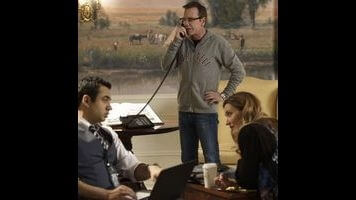Which may be why “One Hundred Days” is as effective as it is. The episode starts with Kirkman giving a press conference in which he asks the assembled reporters (and the country at large) to give him the benefit of a fresh start; after struggling to rebuild the government in the wake of the tragedy that put him in the highest office in the land, the new president wants a chance to begin agaih with his plans for the future. It’s a sign of the show’s general optimism about how politics and reporting works that this request is met with general acceptance, but this is justified somewhat by the novelty of the situation; presumably if the government just blew up, most people would want any chance to pretend things are normal.
So we get Kirkman struggling with political squabble, infighting, and (gasp) the spouse who speaks her mind and gets her husband into a spot of trouble. It’s a nice change of pace, honestly. The president is still the Jimmy Stewart-esque straighter shooter he’s been from the start, but having to grapple with legitimate problems that even his fundamental decency can’t circumvent is a necessary step in making sure the show doesn’t float away into pure fantasy land.
Take what happens with Alex. While speaking in front of a luncheon, the First Lady gets ambushed by a question about gun control. She answers truthful, with a response that I suspect most of the show’s viewers would support (this is not the sort of series that wants to poke and prod and upend its audience’s perspective), an entirely reasonable “We need to deal with this” answer, but because it threatens to undermines Kirkman’s efforts to push a new agenda, she has to walk back what she said in a later interview.
This is pretty expected politics stuff: acknowledging that simply stating your opinion on an issue can potentially get you into trouble even when your opinion is reasonable and seemingly non-inflammatory isn’t exactly a stunning truth. But it’s still a nicely done series of dramatic beats, undercut only slightly when Kirkman manages to revisit his wife’s ideas during a town hall. Again, this is a fantasy, and while it would be nice if the show let a conflict linger every once in awhile, there’s also something uplifting about imagining a world where perfectly sensible observations aren’t immediately disastrous.
The fact that the show at least acknowledges that this stuff is tricky helps to keep this from being dramatically flat. Kirkman wants a do-over, and he seems to get one, but that doesn’t mean an exemption from the maneuvering of other politicians to push their own agendas. The town hall gives Kirkman a chance to demonstrate his abilities as a leader, which is a necessity given how much time the past few weeks have spent reminding us that he stumbled into this position by accident. (Or worse, by the design of villains who legitimately thought he would make their lives easier.) It’s a corny scene, and at least one of Kirkman’s answers seems reminiscent of something that came up during The West Wing, but Sutherland’s sincerity means it works fairly well. The guy needed a win, and watching him handle some moderately tough questions and bond with the public isn’t a bad way to give him one.
Meanwhile, Aaron’s at loose ends since quitting his job. He spends some time with a cousin applying for an internship with a senator, and it’s a nice excuse to establish him as more than just the slick guy who we didn’t entirely trust at the start of the season. (I like how his hair is all floppy when he’s out of work.) All this is ultimately designed to get him working on Hookstraten’s team, but it does a good job of making him more than just another Washington operator, to the point where having him back on the scene at the episode’s end felt like a net gain, rather than just an inevitable excuse to make sure an actor doesn’t get lost in the shuffle.
On the conspiracy front, there’s some progress. Chuck, Hannah’s pet tech geek, tracks down Claudine Poyet via a photographed fingerprint (I have no idea if this is possible, and honestly don’t care; it’s just clever enough that I want to pretend it’s real), and finds out her real name is Brooke Mathison. Then Brooke’s organization blows up Chuck’s apartment. For a group that managed to kill most of the government, these guys aren’t great at their jobs; Chuck and Hannah survive, and Hannah tracks her to a house where Jason gets a chance to prove his sanity, before Brooke does the old “villain who received mercy goes for a secret weapon” routine. Exit Brooke, which means we’ve pretty much run out of recognizable bad guys. What’s next?
Stray observations
- I suspect Chuck has a crush on Hannah, and she is not aware of this. Shocker, I know.
- “Does it ever weird you out that you and Dad are like… the President and First Lady?” The show has largely sidelined Kirkman’s kids, which is a smart move; but it’s nice to see Leo hasn’t completely lost his touch.
- “Where does he stand on gun control?” “Well, he’s from Montana, sir.”





























![Rob Reiner's son booked for murder amid homicide investigation [Updated]](https://img.pastemagazine.com/wp-content/avuploads/2025/12/15131025/MixCollage-15-Dec-2025-01-10-PM-9121.jpg)











